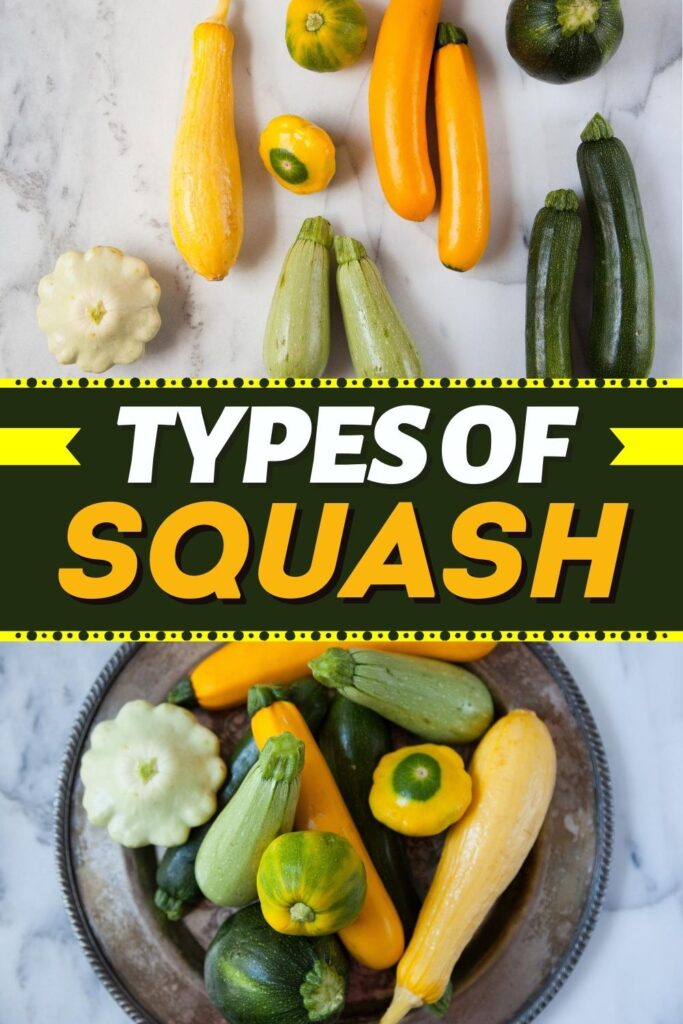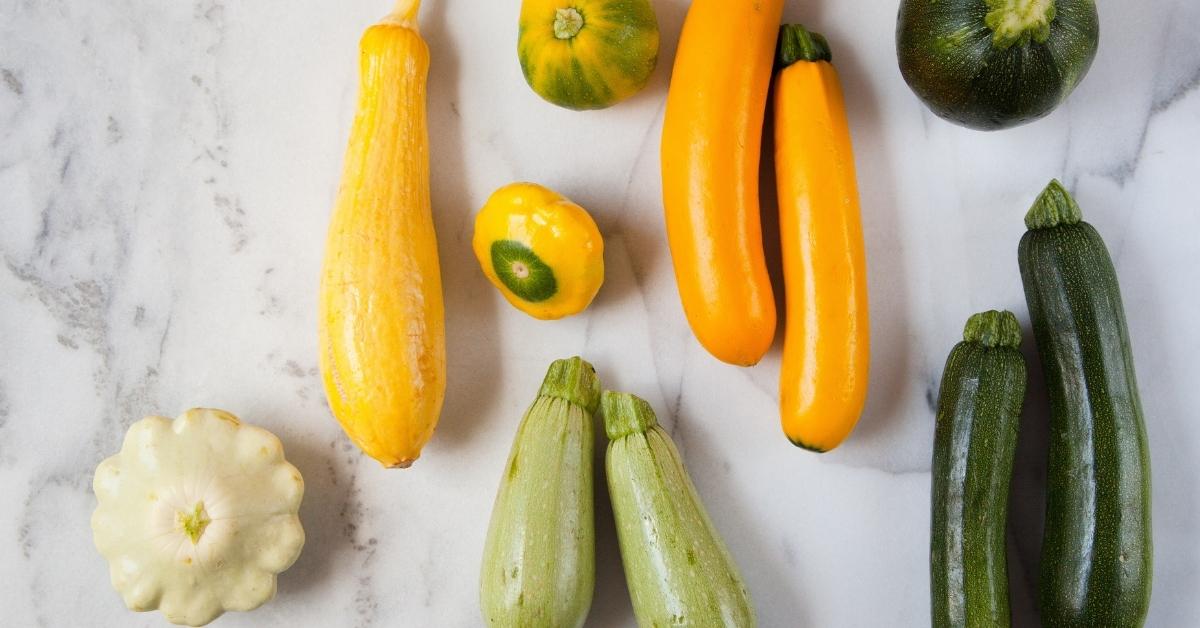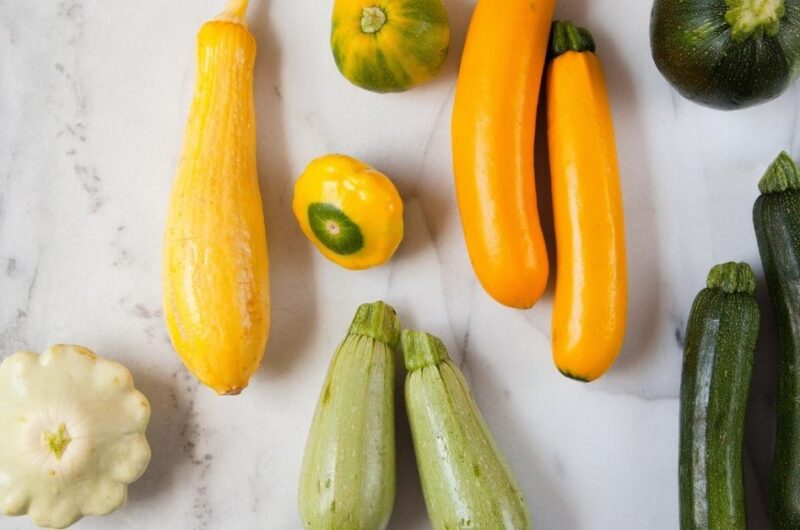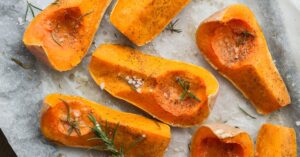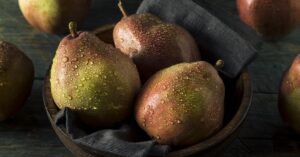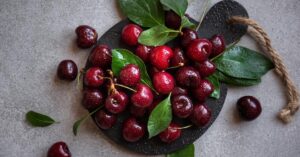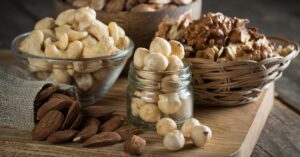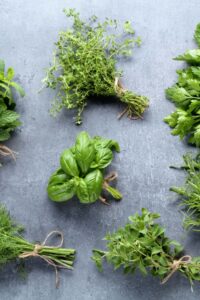Depending on the time of year, you’ll find all different types of squash on the shelves.
For example, zucchini is one of the most well-known summer varieties, whereas pumpkin is firmly in the fall-winter crowd.
Luckily, that means you can have squash all year long!
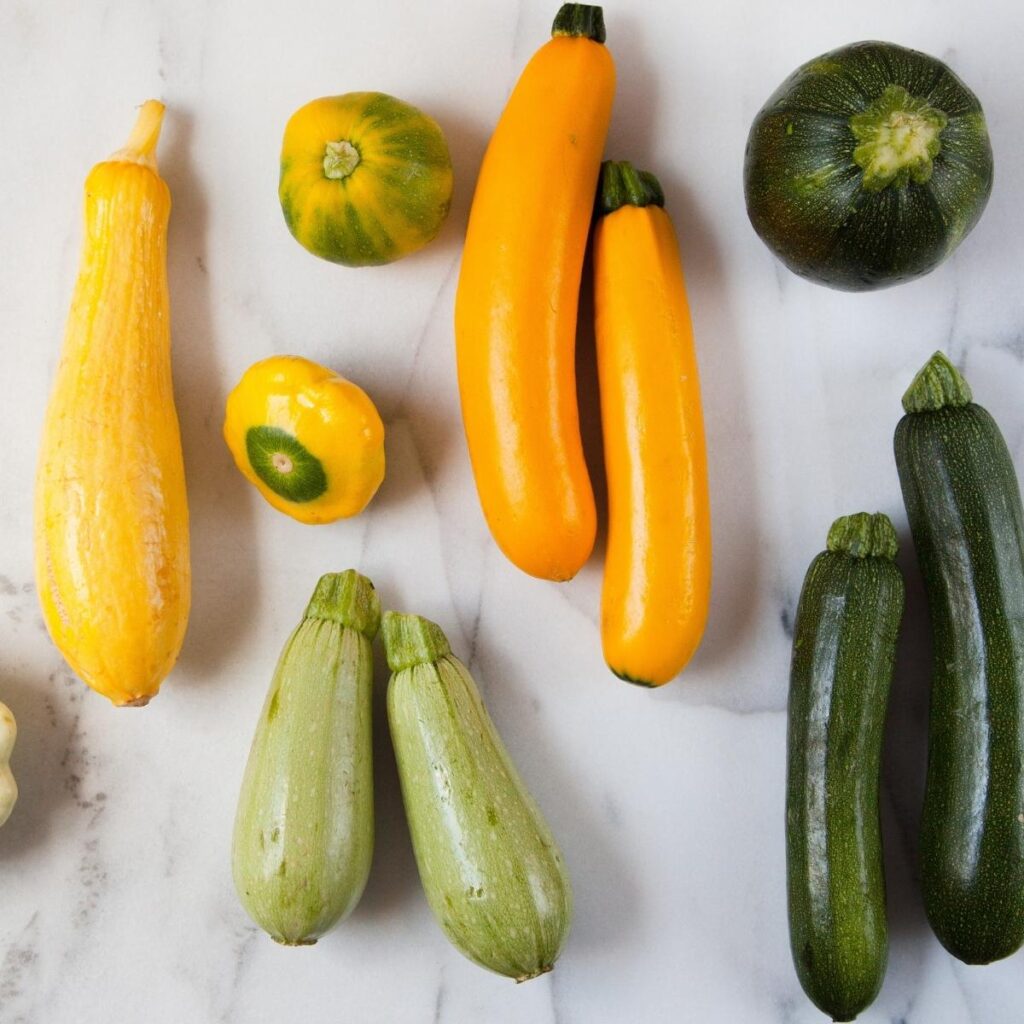
And there are so many unique colors and flavors, as well as recipes to make with them.
So if you’re curious about this surprisingly diverse vegetable, check out these different types of squash.
You never know; you might find a new fave!
What’s the Difference Between Summer Squash and Winter Squash?
The main difference between summer squash and winter squash is that the latter typically has thicker, harder skin. In contrast, summer squash is quite soft on the inside and the outside. Therefore, it needs to be cooked for a shorter time than winter squash to keep it from becoming mushy.
Summer squash is often lighter in color, though that’s not the case with the most popular of the bunch: zucchini.
Other varieties include yellow, patty pan, and chayote squash. Generally speaking, these types of summer squash can be cooked and eaten as is.
Meanwhile, we usually cut the skin off winter squash because it’s hard (even after cooking in some cases).
The most common types of winter squash are acorn and butternut, along with the infamous pumpkin!
Types of Winter Squash
1. Acorn Squash
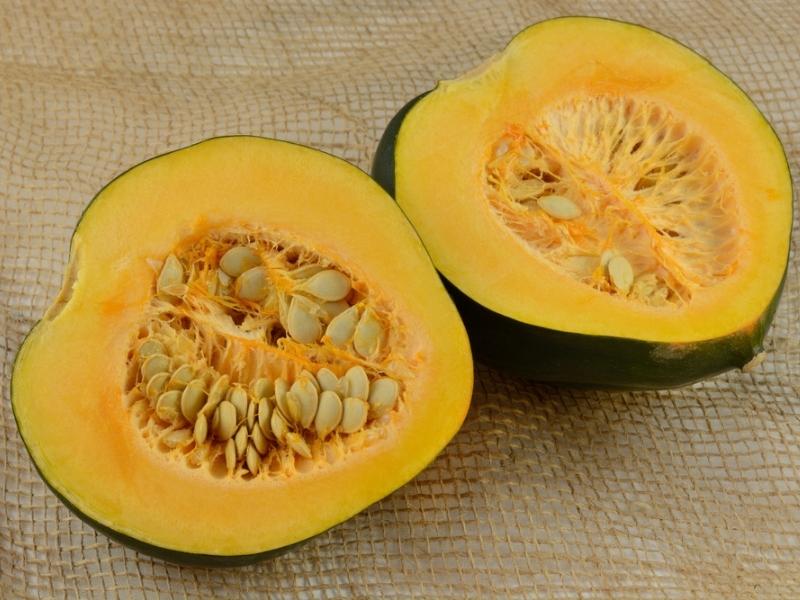
Acorn squash is an autumnal gourd with a sweet, nutty flavor.
When cooked, it takes on a creamy consistency that’s similar to sweet potatoes or pumpkin.
The sweet flavor of the squash is balanced by the earthy taste of the seeds, making it a versatile ingredient for both sweet and savory dishes.
2. Butternut Squash
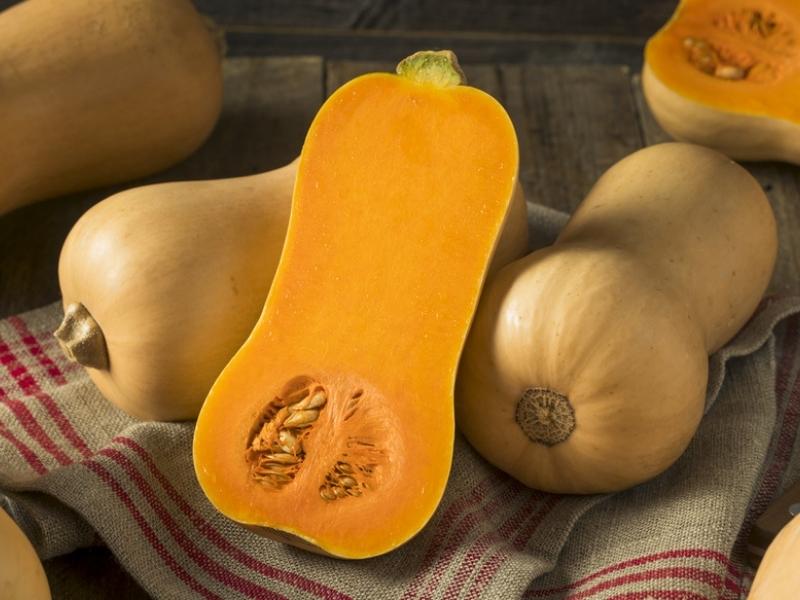
Butternut squash is a pear-shaped winter squash with creamy-white/orange skin.
It has a sweet, nutty flavor that’s similar to pumpkin.
When cooked, butternut squash can be used in a variety of dishes, including soups, stews, pies, and casseroles.
It can also be combined with other fruits and vegetables, such as apples, carrots, and potatoes, to make delicious side dishes or casseroles.
3. Delicata Squash
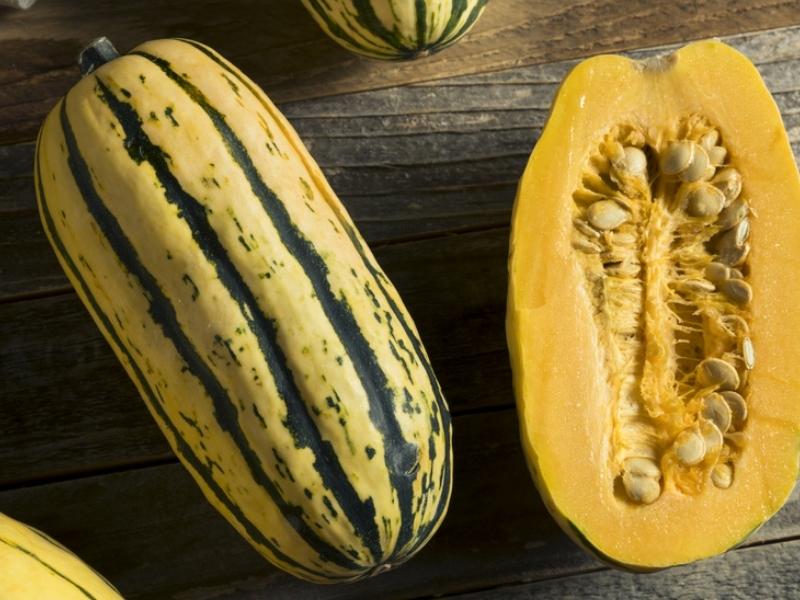
The flesh of the delicata squash is yellow or orange and has a rich, sweet flavor.
It’s often used in pies and desserts, as well as savory dishes such as soups and stews.
The squash can also be roasted or sautéed and served as a side dish.
4. Kabocha
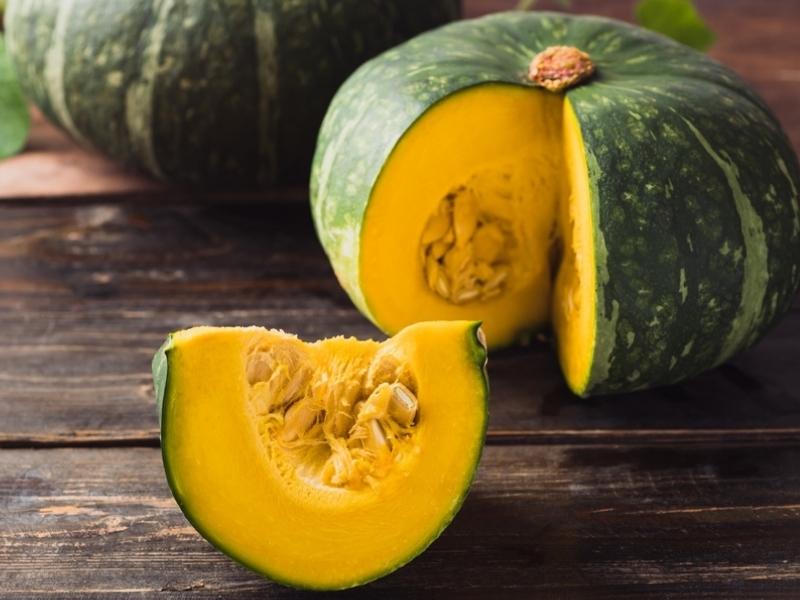
Kabocha squash is a type of winter squash popular in Japan.
It has green skin and orange flesh and is generally round or oval. In fact, it kind of looks like a bright green pumpkin.
The texture is dense, and the flavor is slightly sweet.
When selecting a kabocha squash, look for one that’s heavy for its size and has a deep green color.
5. Pumpkin

Pumpkins are usually harvested in the fall, and their sweet flesh is a favorite in autumn desserts, be it cakes, cookies, pies, or even ice cream.
In addition to being delicious, pumpkins are also a good source of vitamins and minerals, such as Vitamins A and C, potassium, and fiber.
6. Red Kuri
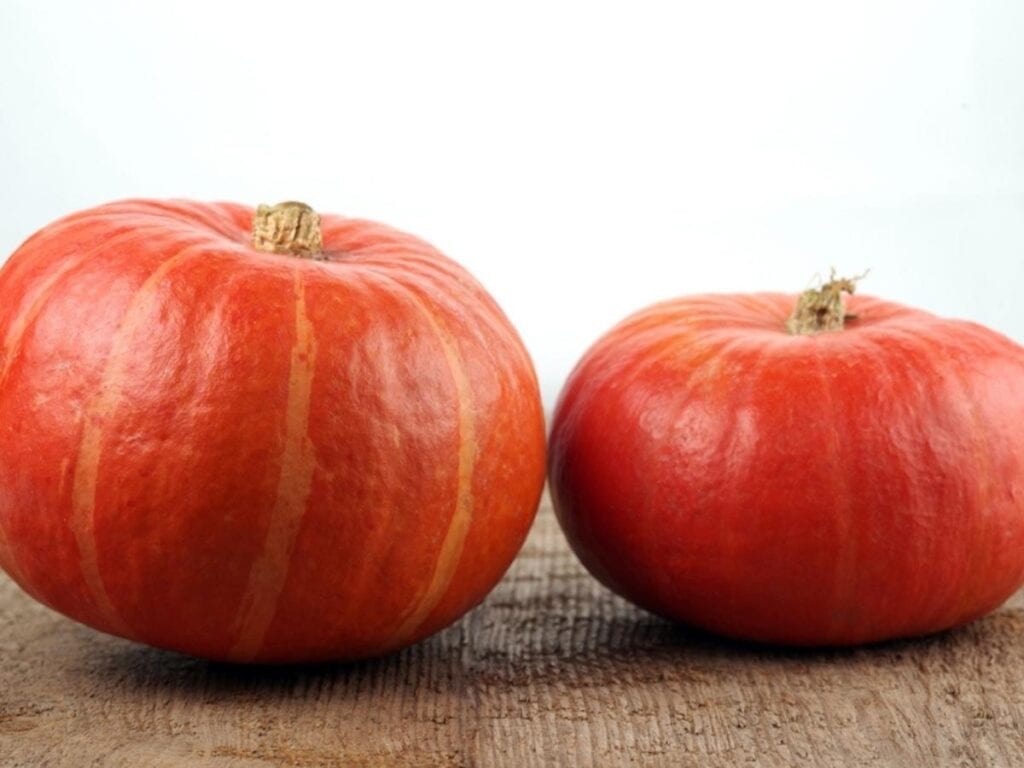
The red kuri squash is small and round with bright red-orange skin. It has a sweet, nutty flavor that’s similar to chestnuts.
When selecting a red kuri squash, look for one that is heavy for its size and has smooth, shiny skin.
The squash should be free of blemishes and bruises.
7. Spaghetti Squash
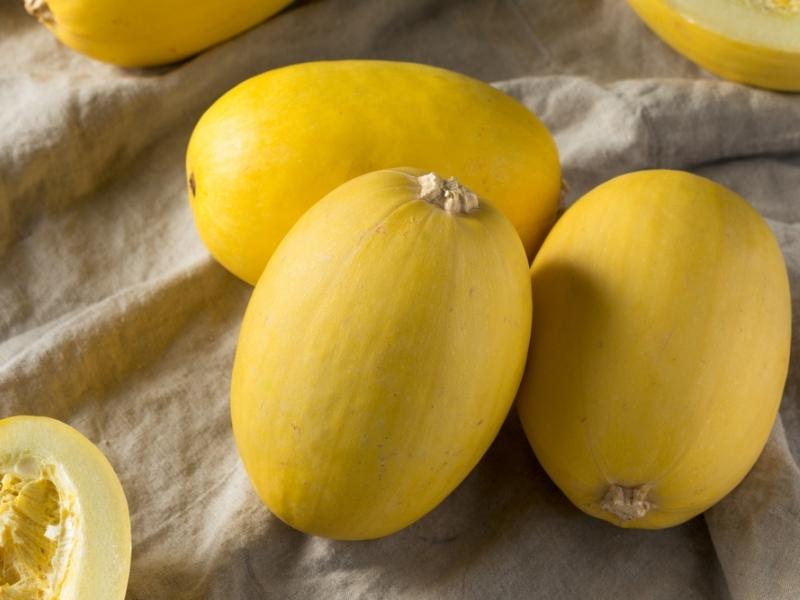
Spaghetti squash is a unique and versatile vegetable that can be enjoyed in various ways.
This plump, yellow vegetable gets its name from its stringy flesh, which resembles spaghetti when cooked.
Spaghetti squash has a mellow, sweet flavor that pairs well with both savory and sweet dishes.
It’s a terrific low-carb alternative that’s also packed with vitamins, minerals, and antioxidants.
8. Sweet Dumpling Squash
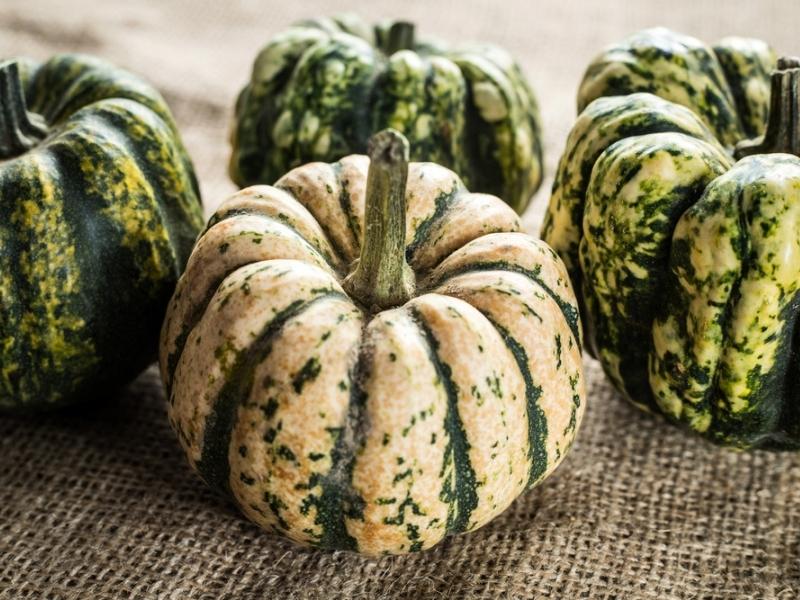
Sweet dumpling squash is a small, round squash with deep green skin and white stripes.
It has a sweet, nutty flavor similar to pumpkin or sweet potato. It can be roasted, baked, or steamed, and it’s delicious with a holiday feast.
It grows in warm climates such as the Mediterranean, Africa, and the Middle East.
9. Carnival Squash
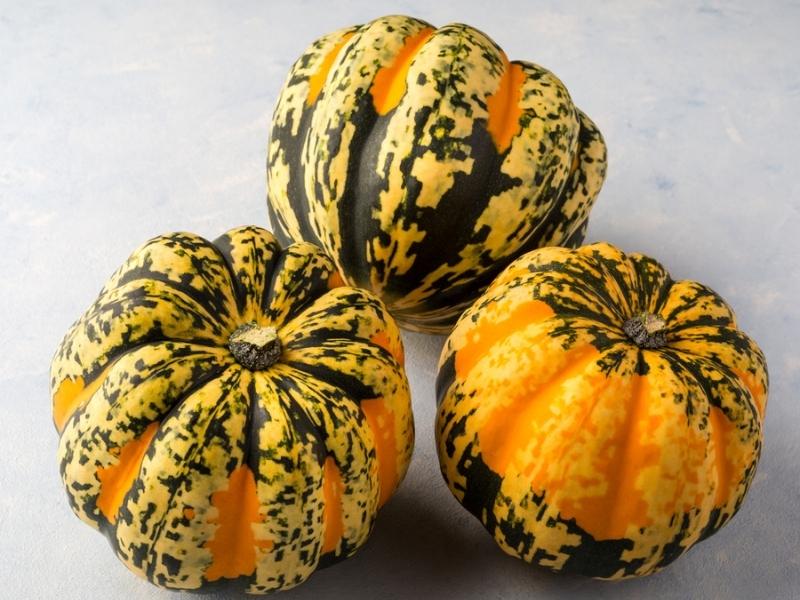
You can easily distinguish carnival squash by its small size, round shape, and scalloped edges.
The flesh is dense and sweet, making it a popular choice for baking and roasting.
Additionally, the thin skin of the carnival squash makes it easy to prepare without peeling.
10. Hubbard Squash
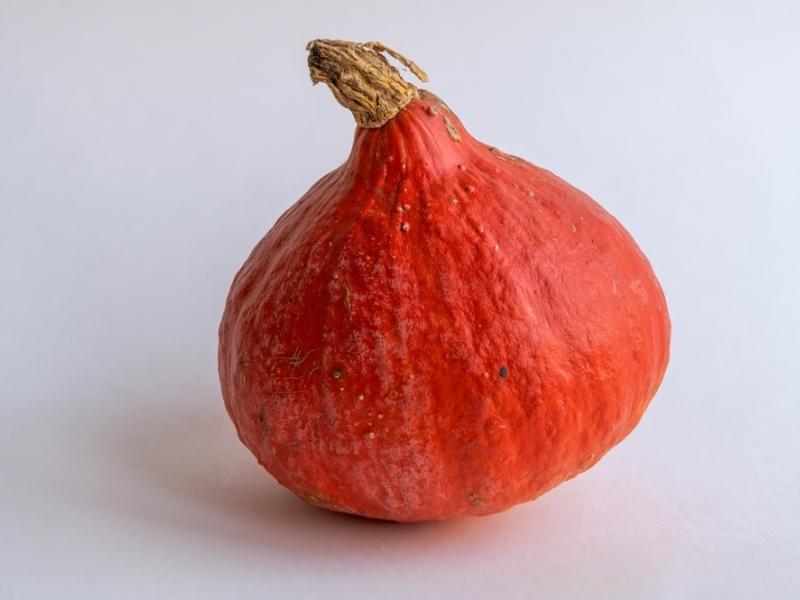
Hubbard squash is another easy-to-recognize squash with its large, oblong shape and dull, bumpy skin.
It ranges from dark green to grayish-blue and can weigh up to 15 pounds.
Underneath its thick skin, hubbard squash has a moist, orange flesh that’s sweet and nutty. It’s typically available from October through December.
11. Wee B Little Pumpkin
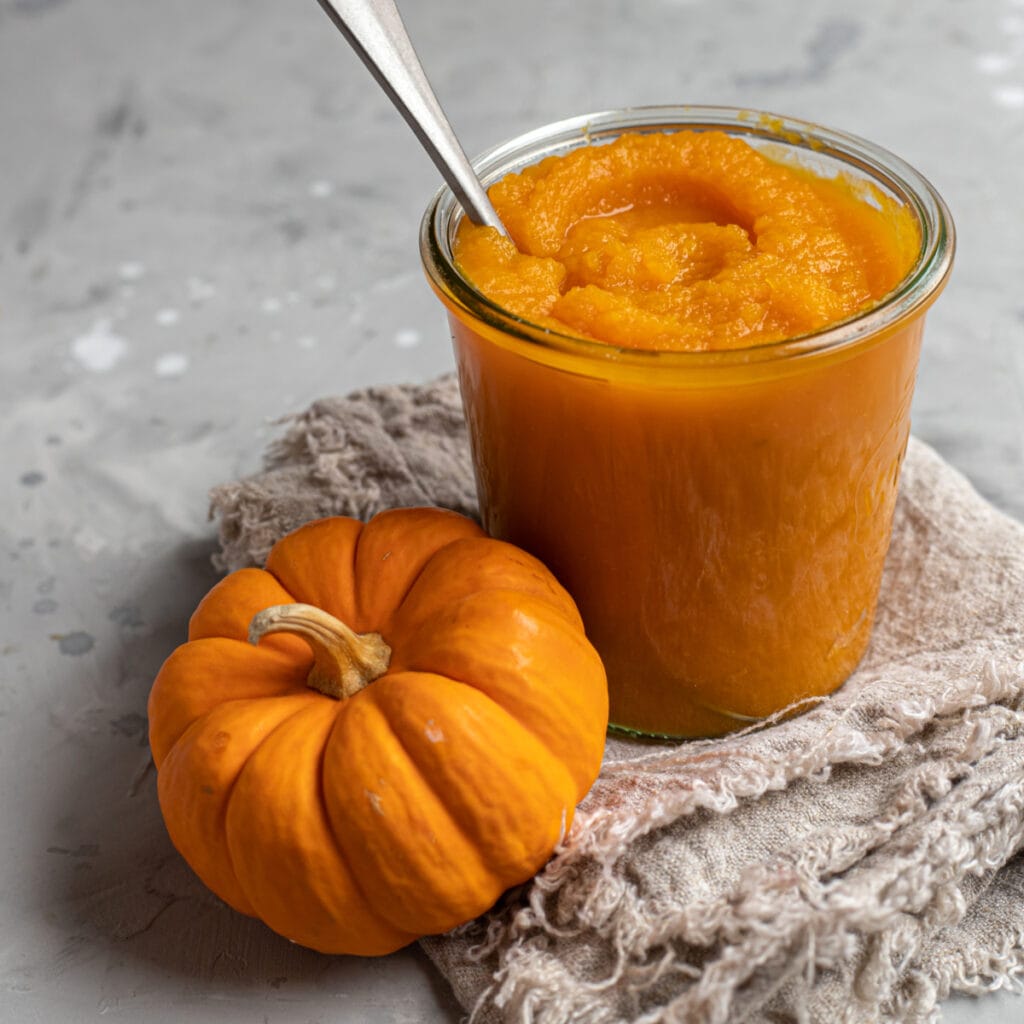
How adorable is this little pumpkin?
About the size of a baseball, this little cutie is more suited to decoration than eating.
It has a shape that’s almost identical to a normal pumpkin, only much smaller, of course.
The skin is bright orange, and the flesh is dense and sweet, so it’s great for kids. It’s also fabulous as a stuffed pumpkin starter for the holidays.
12. Turban Squash
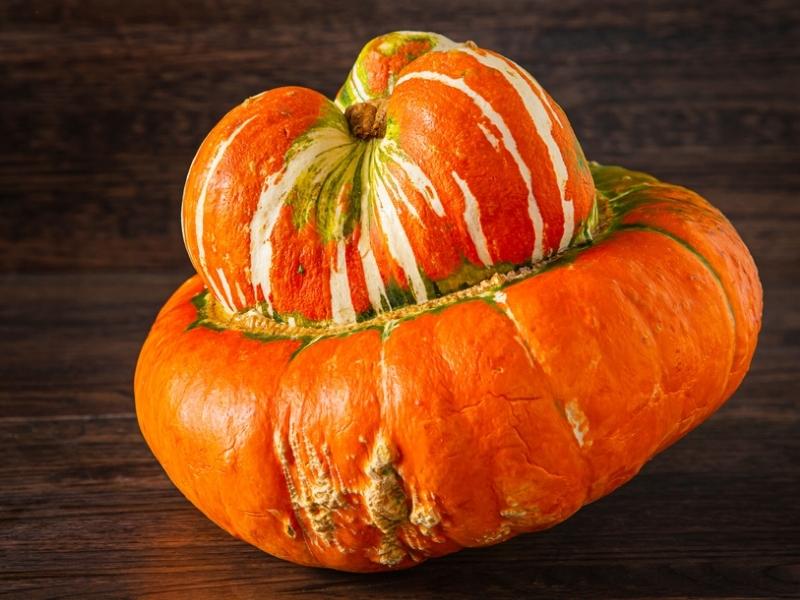
With its unique turban-like top and round bulbous base, the turban squash is one of the most unusual on the list.
The skin is typically a deep green, although some varieties can have orange or yellow streaks.
The flesh of the squash is fairly dense and has a sweet, nutty flavor.
13. Honeynut Squash
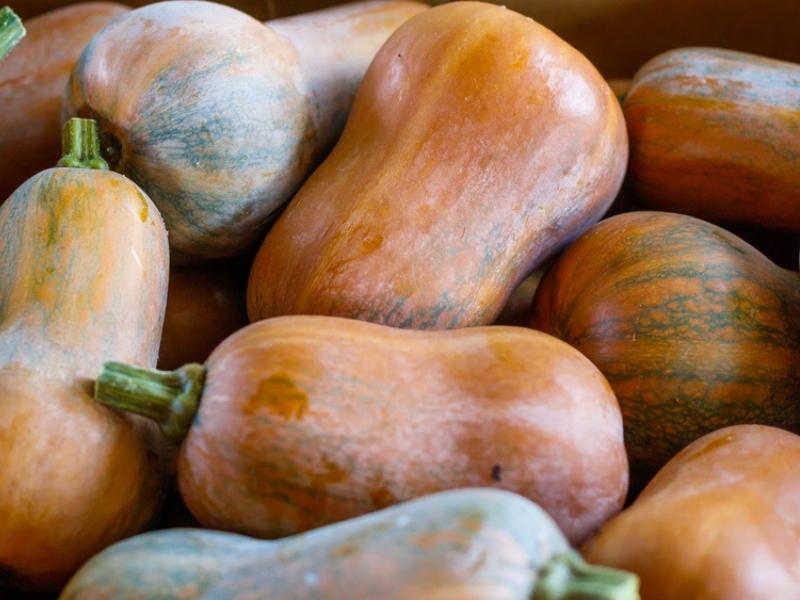
It looks a lot like butternut, and the name is even similar, but the honeynut squash is smaller and rounder with a rich, sweet flavor.
The flesh is much deeper in color too, so it’s ideal for baking.
Honeynut squash is grown in many parts of the world but is most popular in North America.
Typically harvested in the fall, it can be found in most grocery stores from September through November.
Types of Summer Squash
14. Zucchini
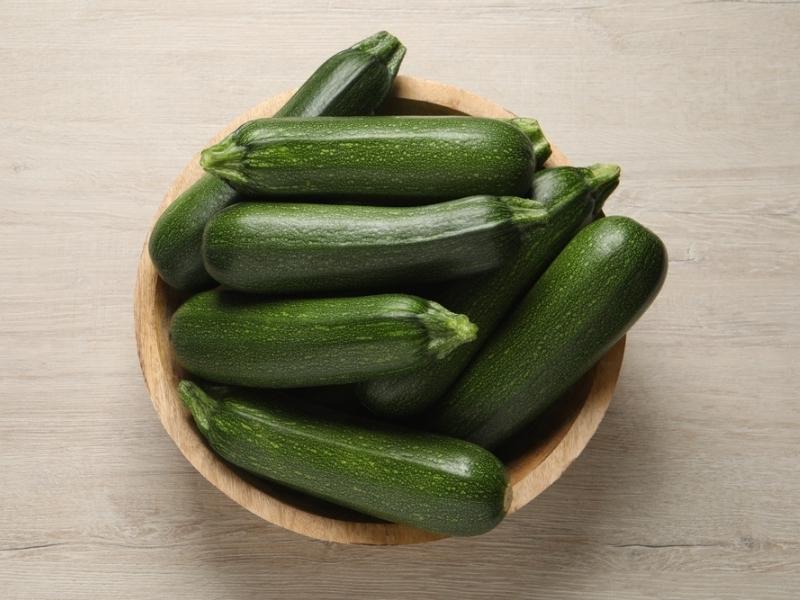
Zucchini is arguably one of the most popular squash types.
It has a mild flavor and tender texture, making it a popular choice for stir-fries, salads, and pasta dishes.
The skin is thin and edible, so there is no need to peel it before cooking. And it can even be grated and added to cakes and cookies.
Zucchini is also a good source of vitamins A and C, as well as potassium and fiber.
15. Yellow Squash
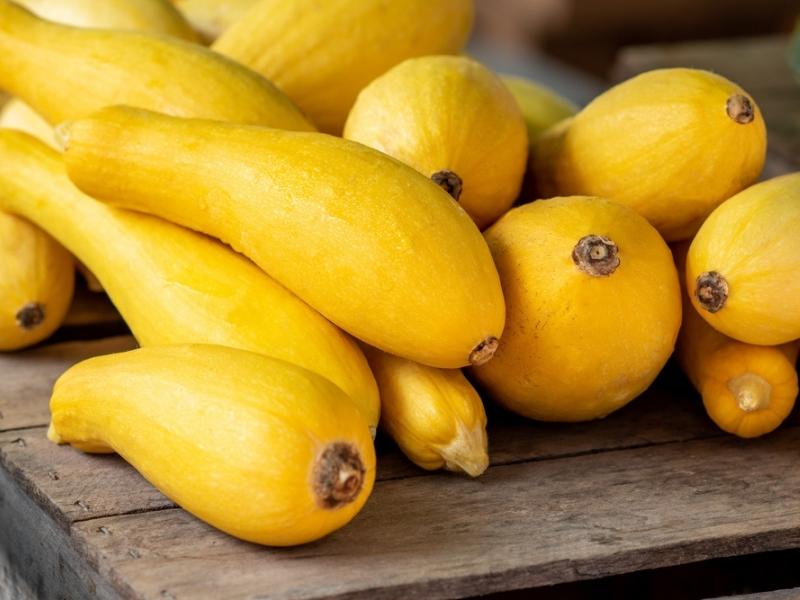
Though yellow squash is available year-round, its peak season is from June to August. That’s why it’s also simply known as summer squash.
When choosing a yellow squash, look for one that is firm and brightly colored. Avoid squashes that have bruises or are starting to soften.
16. Patty Pan Squash
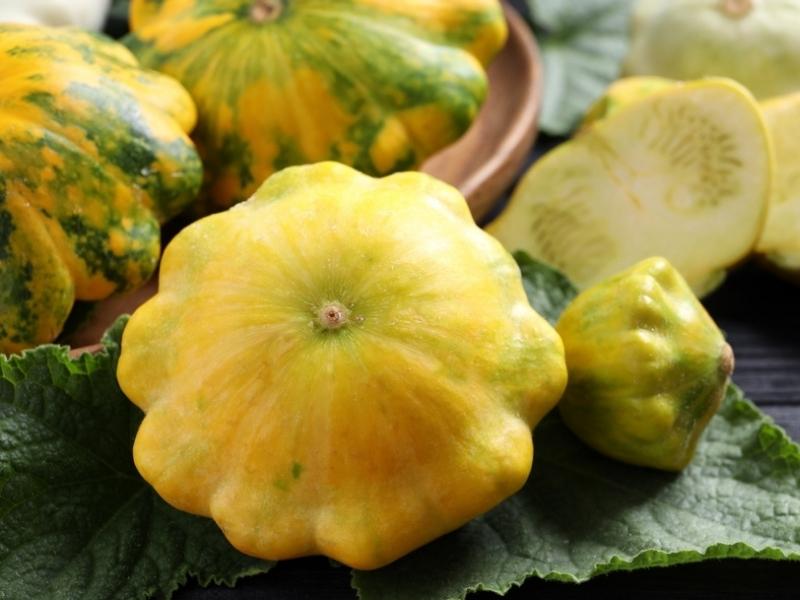
Patty pan squash, also known as baby aubergine, is a small, squat summer squash with scalloped edges.
It’s usually pale green or yellow, although some varieties can be quite colorful.
Patty pan squash has a mild and slightly sweet flavor, and when young and tender, the skin is edible and can be simply steamed or grilled.
17. Chayote Squash (Mirliton)
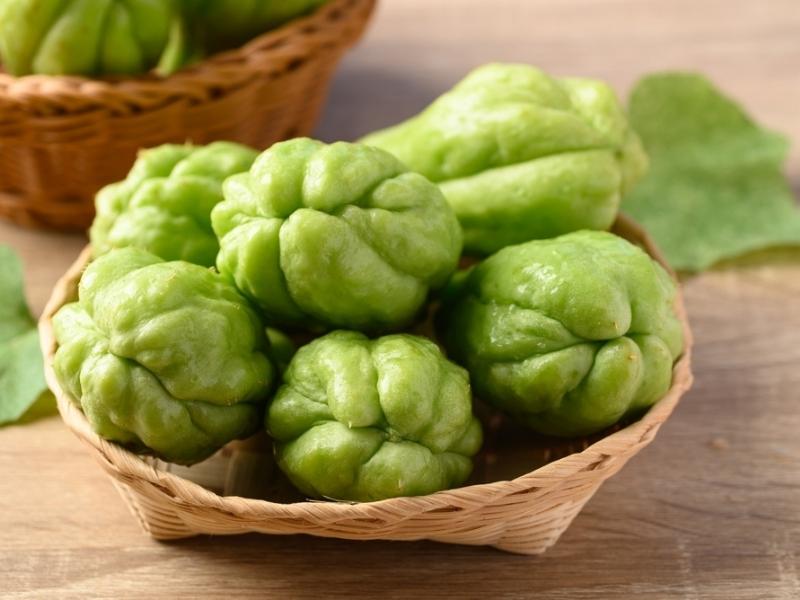
Chayote squash, also known as mirliton, is a unique vegetable found in many Latin American markets.
It resembles a green pear and has a mild, slightly sweet flavor.
Chayote squash is also known for its medicinal properties. It’s believed to help with digestive problems and is often used as a natural diuretic.
18. Banana Squash
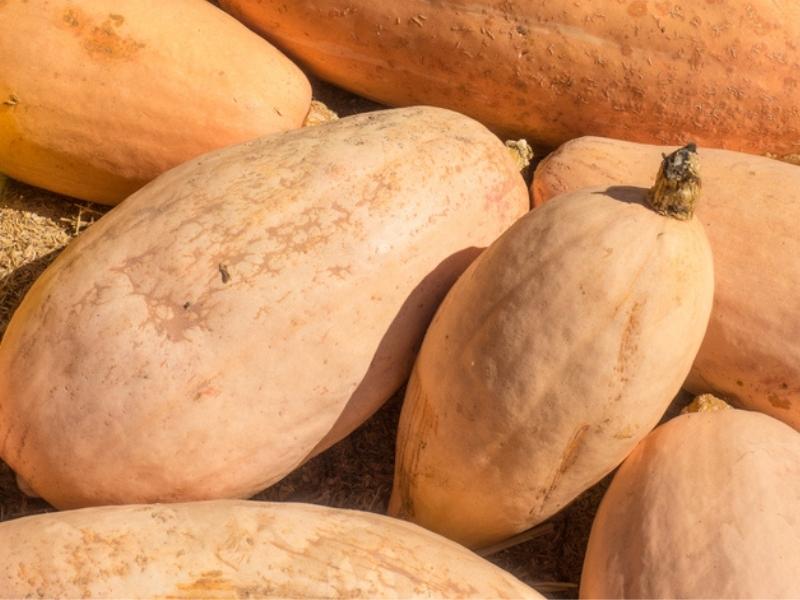
Though it’s named banana squash, I think this looks more like a pale papaya!
No matter; it’s a fun summer squash with a thin skin that’s edible. The flesh is delicate, sweet, and great for baking.
19. Cousa
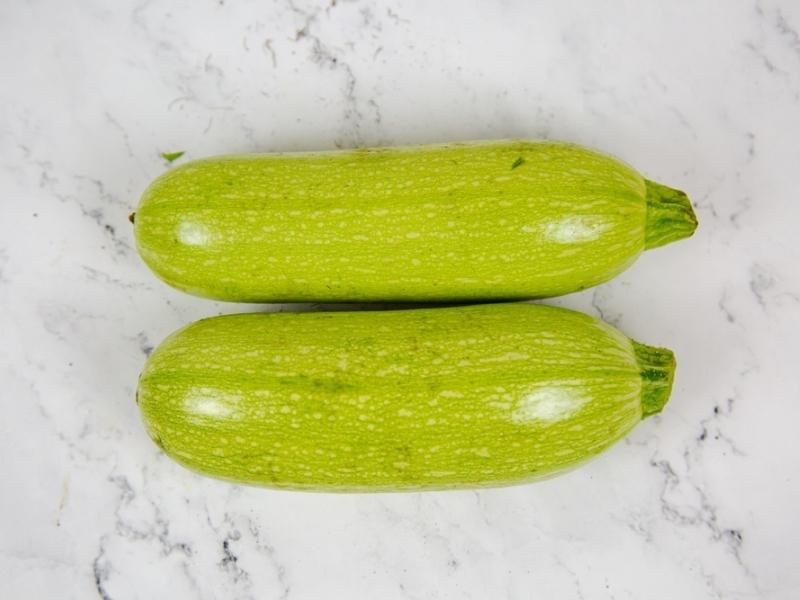
Native to the Mediterranean region, cousa is a summer squash with an oblong shape and light green skin.
They have a mild, slightly sweet flavor, and their flesh is firm and slightly crunchy.
Cousa squash can be eaten raw or cooked, are often used in soups and stews.
20. Crookneck
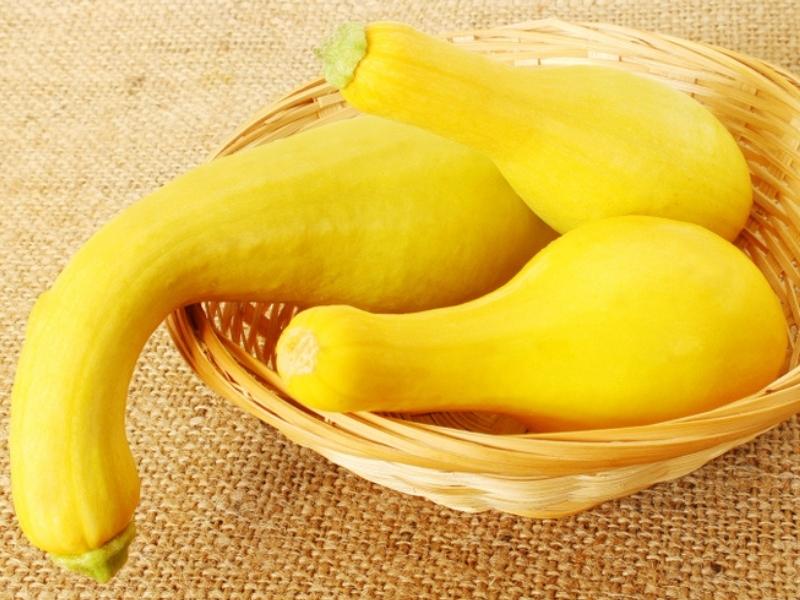
As you’ve probably guessed, the crookneck squash gets its name from its curved neck.
It has yellow or orange skin and soft flesh. The flavor is mildly sweet and often compared to a summer zucchini.
This squash can be sliced and sautéed, added to soups or stews, or simply grilled with a bit of olive oil and salt.
21. Zephyr
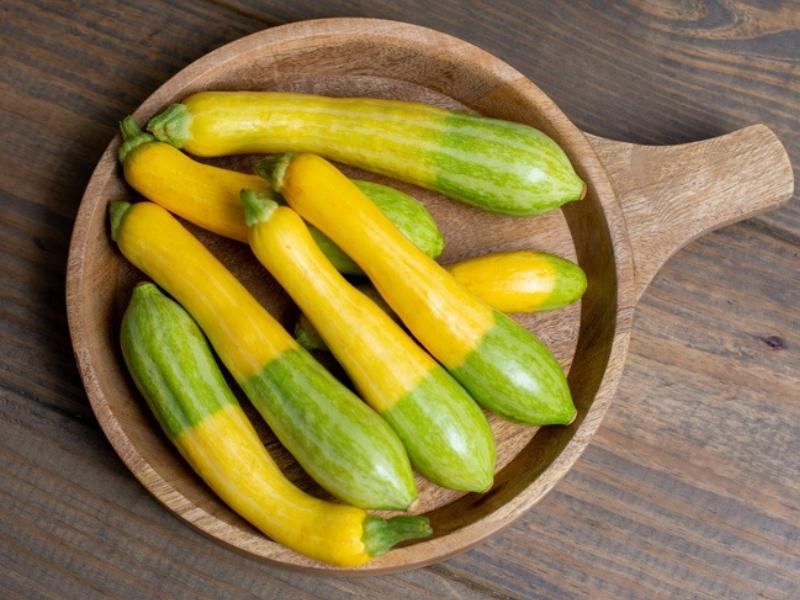
A hybrid of the delicata and sweet dumpling squash, the zephyr squash has a small, oblong shape with light green skin and orange streaks.
The flesh is dense and sweet, with hints of cinnamon and nutmeg.
Zephyr squash are typically harvested in late summer or early autumn. They can be roasted, baked, or mashed.
22. Tromboncino
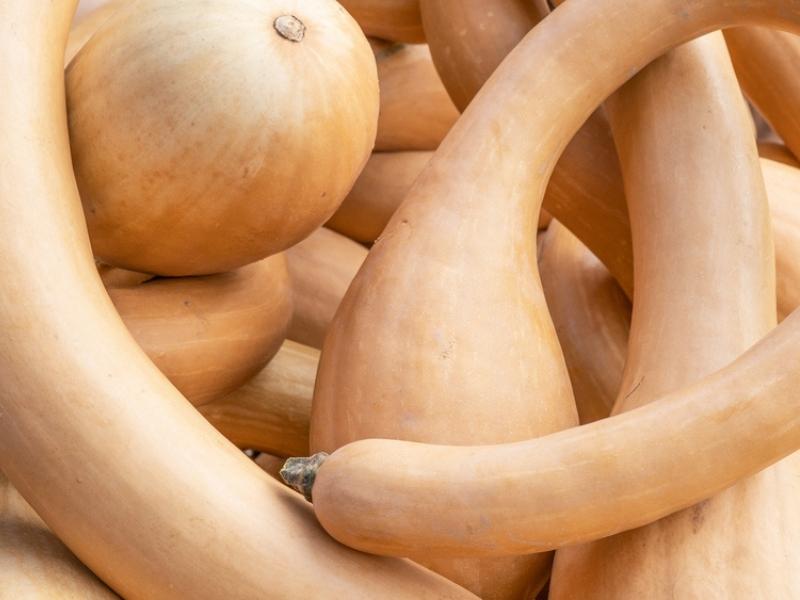
The tromboncino squash is a dietary powerhouse masquerading as a fruit.
Its rich, nutty flavor and fleshy texture make it a versatile ingredient for sweet or savory dishes.
And it’s packed with vitamins and minerals, making it a healthy addition to any diet. It has a long, cylindrical shape with green or pale orange skin.
23. Tatume
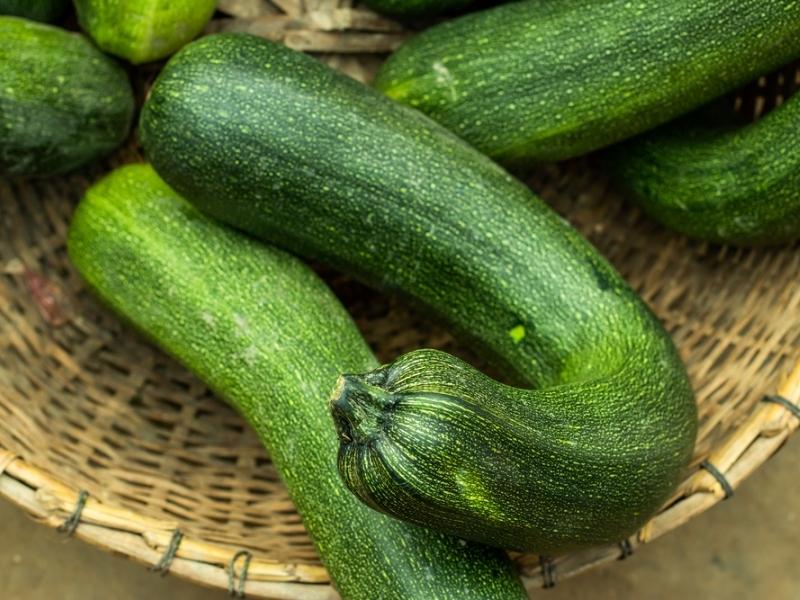
This Mexican squash has light green skin with orange highlights, and its flesh is orange-yellow and very sweet.
Tatume squash is often used in stews and soups but can also be roasted, grilled, or pureed.
24. Round Zucchini (Globe Zucchini/8 Ball Zucchini)
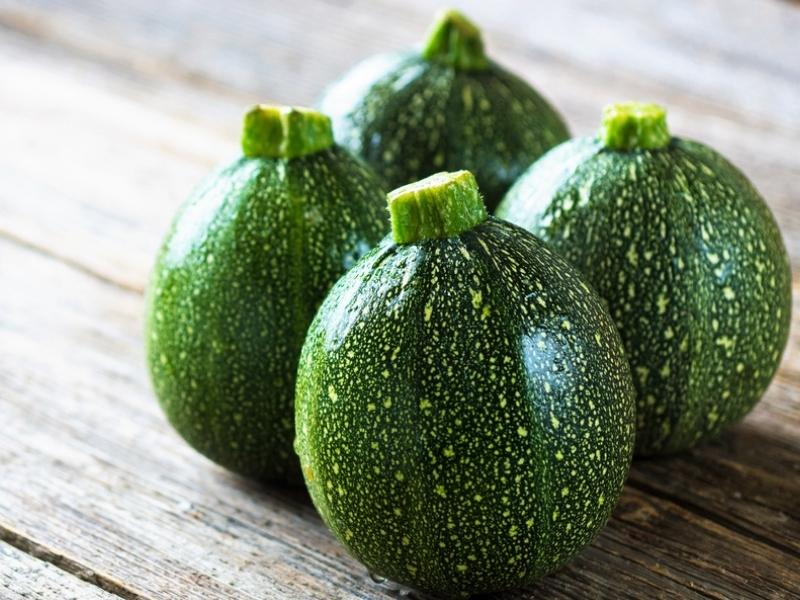
With its round shape and small size, you’d be forgiven for thinking this was a mini watermelon.
Instead, it’s a round zucchini! It has Green skin with white stripes and is smooth and tender.
The flesh is white, firm, and has a mild, sweet flavor. The seeds, on the other hand, are small and edible.
25. Gold Rush
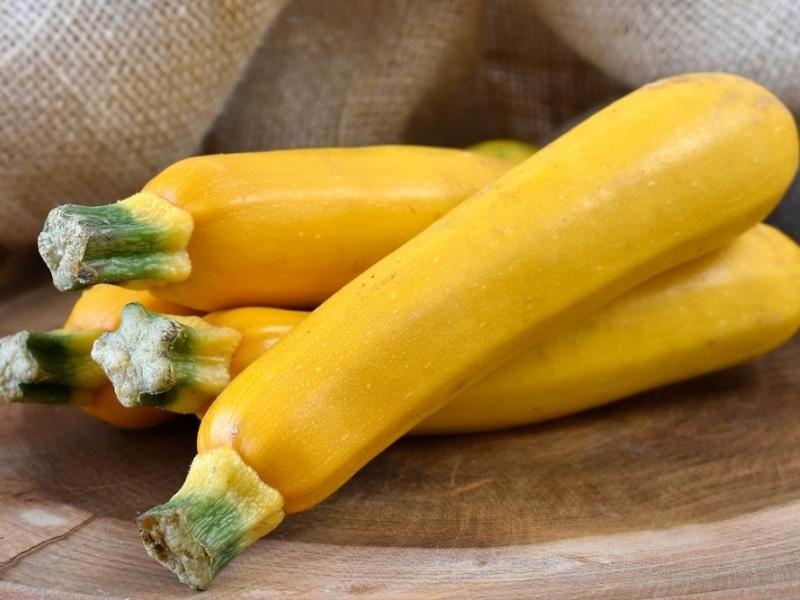
Gold Rush squash has a distinctive golden hue, is relatively small in size (averaging about two pounds), and has smooth, glossy skin.
The flesh is dense and creamy, with a sweet, nutty flavor. When cooked, it takes on a deep orange color.
It’s ideal for roasting and baking and is filled with nutrients and vitamins.
